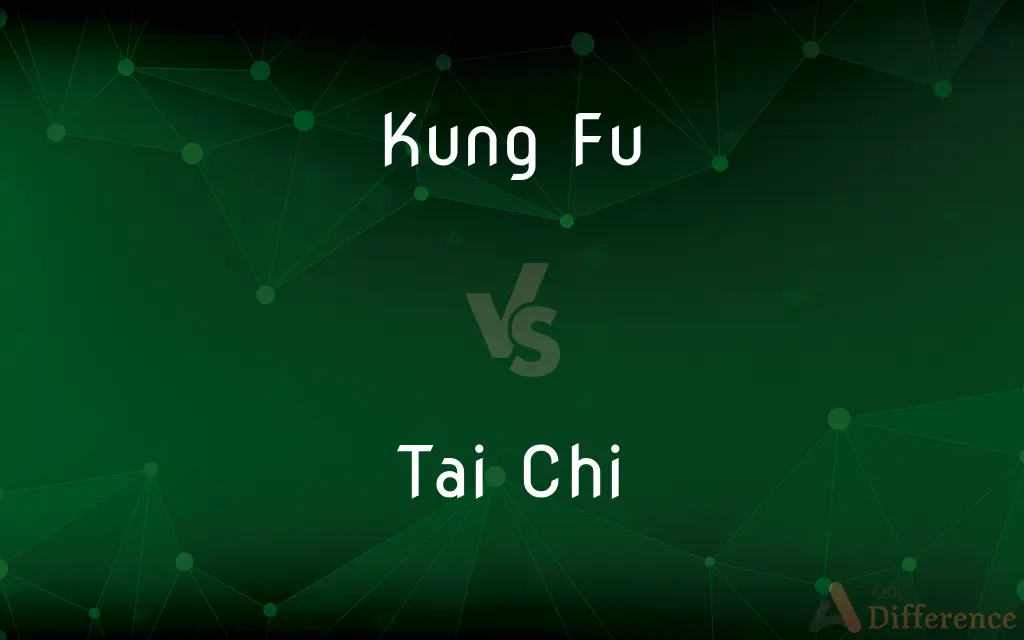Kung Fu vs. Tai Chi — What's the Difference?
Edited by Tayyaba Rehman — By Fiza Rafique — Published on November 6, 2023
Kung Fu is a broad term for Chinese martial arts, emphasizing combat and self-defense, while Tai Chi is a form of martial arts focused on fluid movements and internal energy for health and meditation.

Difference Between Kung Fu and Tai Chi
Table of Contents
ADVERTISEMENT
Key Differences
Kung Fu and Tai Chi, both originating from China, offer unique approaches to martial arts. Kung Fu is an umbrella term encompassing a variety of Chinese martial arts forms, each having distinct techniques, stances, and philosophies. Predominantly, Kung Fu techniques are devised for combat, stressing agility, speed, and strength. Tai Chi, on the other hand, is rooted in its soft, fluid movements and deep breathing exercises, where practitioners harness and balance their internal energy, known as "chi" or "qi."
While Kung Fu's dynamic moves and forms make it easily recognizable as a martial art, Tai Chi's slow, rhythmic sequences might be perceived as a dance or moving meditation by an observer. This is because Tai Chi, while having martial applications, is often practiced today for its health benefits, promoting relaxation and improving balance.
The intent behind practicing Kung Fu and Tai Chi can differ vastly. Many Kung Fu students aim to master self-defense tactics, enhance physical fitness, or participate in sparring and competitions. Meanwhile, Tai Chi enthusiasts might be drawn to its therapeutic effects, improving mental well-being, flexibility, and aiding in stress relief.
That said, the core of both Kung Fu and Tai Chi revolves around the harmony of mind, body, and spirit. Though they differ in execution, both arts require dedication, discipline, and a deep understanding of the underlying principles to truly master.
Comparison Chart
Primary Focus
Combat and self-defense
Fluid movements, health, and meditation
ADVERTISEMENT
Movement Style
Dynamic, fast-paced
Slow, rhythmic sequences
Popular Perception
Martial art with distinct fighting techniques
Moving meditation or dance-like form
Primary Benefits
Physical fitness, self-defense skills
Mental well-being, flexibility, stress relief
Origin
Various regions of China
Rooted in Chinese Taoist philosophy
Compare with Definitions
Kung Fu
Incorporates both armed and unarmed techniques.
In Kung Fu, practitioners might learn to wield weapons like staffs or swords.
Tai Chi
Often viewed as a form of moving meditation.
The slow-paced nature of Tai Chi allows for introspection and focus.
Kung Fu
An umbrella term for diverse fighting styles from China.
Different regions in China have their unique styles of Kung Fu.
Tai Chi
A martial art emphasizing fluid movements and internal energy.
She practiced Tai Chi every morning for relaxation.
Kung Fu
Focuses on agility, strength, and speed in movement.
The Kung Fu demonstration showcased incredible acrobatic feats.
Tai Chi
Aims to balance the body's "chi" or "qi" through movement.
Tai Chi practitioners believe in harnessing and harmonizing their life force.
Kung Fu
A Chinese martial arts form emphasizing combat techniques.
He took Kung Fu classes to improve his self-defense skills.
Tai Chi
Rooted in Chinese Taoist philosophy.
Tai Chi movements are deeply connected to Taoist principles of balance and flow.
Kung Fu
Steeped in Chinese philosophy, traditions, and culture.
Kung Fu goes beyond fighting, embedding lessons from ancient Chinese tales.
Tai Chi
Popular for its health and therapeutic benefits.
Many elders practice Tai Chi to improve balance and flexibility.
Kung Fu
Alternative spelling of kung fu
Tai Chi
Alternative spelling of tai chi
Common Curiosities
Is Kung Fu a single martial art style?
No, Kung Fu encompasses various martial arts styles from China.
Which martial art is often perceived as a moving meditation?
Tai Chi is commonly seen as a form of moving meditation.
Are both Kung Fu and Tai Chi forms of Chinese martial arts?
Yes, both Kung Fu and Tai Chi originate from China as martial arts.
Which is more combat-oriented, Kung Fu or Tai Chi?
Kung Fu is more combat-oriented, while Tai Chi emphasizes fluid movements.
Does Kung Fu involve weapon training?
Yes, some styles of Kung Fu incorporate weapon training.
Are there competitions for Kung Fu and Tai Chi?
Yes, there are competitions for both Kung Fu forms and Tai Chi sequences.
How are the movement speeds different in Kung Fu and Tai Chi?
Kung Fu has dynamic, fast-paced moves, while Tai Chi involves slow, rhythmic sequences.
Can Tai Chi be used for self-defense?
Yes, while Tai Chi is often practiced for health, it has martial applications.
How is the term "Kung Fu" translated in English?
Kung Fu often translates to "skill achieved through hard work."
What is the primary energy or force focused on in Tai Chi?
Tai Chi focuses on balancing the body's "chi" or "qi."
Do Kung Fu and Tai Chi have spiritual or philosophical foundations?
Yes, both are deeply rooted in Chinese philosophy and spiritual principles.
Is Tai Chi only for relaxation or does it have physical benefits too?
Tai Chi is for relaxation, but it also offers physical benefits like improved balance and flexibility.
Which is recommended for stress relief, Kung Fu or Tai Chi?
Both can be beneficial, but Tai Chi is often recommended for its meditative qualities.
Can beginners start with either Kung Fu or Tai Chi?
Absolutely, beginners are welcome to explore both arts based on their interests.
Is Tai Chi beneficial for the elderly?
Yes, many elderly individuals practice Tai Chi for its health benefits and gentle movements.
Share Your Discovery

Previous Comparison
Perennial Rivers vs. Non-Perennial Rivers
Next Comparison
iPod vs. MP3 PlayerAuthor Spotlight
Written by
Fiza RafiqueFiza Rafique is a skilled content writer at AskDifference.com, where she meticulously refines and enhances written pieces. Drawing from her vast editorial expertise, Fiza ensures clarity, accuracy, and precision in every article. Passionate about language, she continually seeks to elevate the quality of content for readers worldwide.
Edited by
Tayyaba RehmanTayyaba Rehman is a distinguished writer, currently serving as a primary contributor to askdifference.com. As a researcher in semantics and etymology, Tayyaba's passion for the complexity of languages and their distinctions has found a perfect home on the platform. Tayyaba delves into the intricacies of language, distinguishing between commonly confused words and phrases, thereby providing clarity for readers worldwide.













































